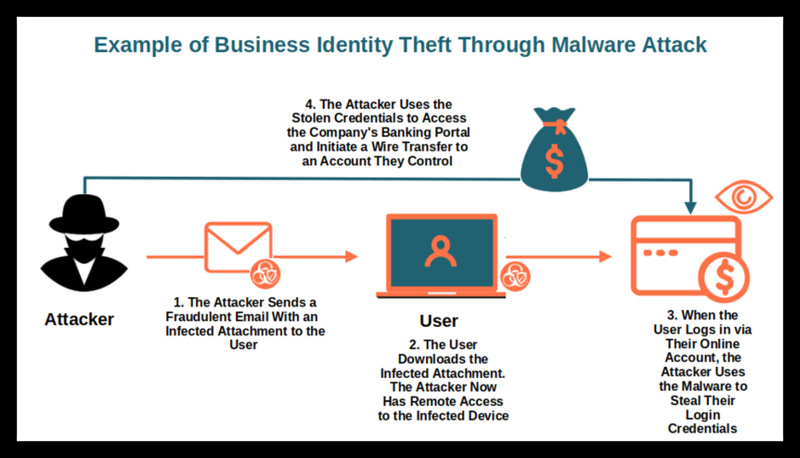The worry of business identity theft is increasing for all types of firms, especially those in the B2B field. With more dependence on digital dealings and online visibility by businesses, the dangers linked to identity theft have risen. Offenders can use weak spots to get important business details which may result in financial harm and damage to reputation. For B2B companies, it's very important to grasp the impact of business identity theft. This problem can not only disrupt their financial balance but also damage the trust and faith of customers. We will delve into what is business identity theft in this article, its effects, and ways how we can secure our business information.
Types of Business Identity Theft
Different types of business identity theft exist that firms operating in the B2B sector should know. A typical way is when thieves use purloined data to establish illegitimate accounts under a corporation's name. This may include applying for credit lines, obtaining loans, or even setting up bogus businesses that earn money via unlawful methods. Another common method is using the name or brand of a business wrongly to fool customers and sellers. These false actions can cause big money losses and trouble in solving arguments. Knowing about these kinds is the first step in building a strong protection plan.

In addition, there are more new types of business identity theft that companies need to keep a watch on. Like for example, wrongdoers might use social engineering tricks to trick workers into giving out private details. On top of this, cybercriminals could aim at a company's online properties like domain names or accounts on social media platforms with the intent to copy the business in cyberspace. For B2B companies who want to protect their identities well, it is very important to understand these changing strategies.
- Vigilance: Keep a close eye on business registrations to detect unauthorized changes.
- Reporting: Always report any suspected fraudulent activities to authorities promptly.
Consequences for B2B Firms
The results of a business's identity getting stolen go far beyond losing money right away. When the name of a company is at risk, it might have to deal with law issues, particularly if any wrong behavior leads to clients or partners initiating legal proceedings against them. On top of that, taking back an identity after theft can take up valuable time and funds which are better used for main business actions. The reputation of a company might be negatively affected when it becomes the victim of identity theft. Customers may become cautious in dealing with such businesses. This damage to trust can be long-lasting, emphasizing why B2B companies need to place high importance on preventing and responding effectively against these threats.
Also, the money effects of business identity stealing can have the following impacts. Besides direct costs related to recovery and possible fines, companies could face higher insurance fees and a drop in getting new customers because their trustworthiness is damaged. Companies might even be examined by regulating authorities, which may result in more penalties or required rules they need to follow. Therefore, understanding these consequences is vital for developing an effective risk management strategy.
- Cost Analysis: Consider the potential long-term costs of identity theft in budgeting.
- Reputation Management: Develop a crisis communication plan to address incidents promptly.
Protecting Business Information
For protection from business identity theft, companies working in B2B need to put thorough security steps into place. Begin with strong cybersecurity methods like firewalls, encryption, and safe access controls. It is very important to do updates on software and systems regularly so as not to allow any weak points for attacks. Training for employees is equally essential. Workers must learn to identify phishing attempts and understand how crucial it is to protect sensitive data. Also, companies should do consistent checks on their security protocols to find possible vulnerabilities and make sure they are following all necessary rules. If a company forms an environment focused on safety, this can greatly lessen the chance of identity theft occurring.

Beyond these basic methods, B2B companies need to think about using more sophisticated technologies for defense. Things like artificial intelligence can be used to keep an eye on deals and find irregularities instantly, allowing faster action against possible risks. Also, setting up multi-factor authentication gives extra protection level which makes it harder for people without permission to access private data. By leveraging technology, businesses can enhance their defenses against identity theft.
- Regular Training: Schedule periodic training sessions for all employees on security practices.
- Technology Updates: Stay informed about the latest cybersecurity tools and best practices.
Response Strategies After a Breach
Despite taking top-notch preventive steps, some enterprises may still become a target of identity theft. When such instances occur, having a clear response plan is crucial. Initially, businesses need to swiftly evaluate how deep is the breach and restrict any additional harm. You might need to inform impacted customers and partners about the circumstance. It could be wise also to tell the police and appropriate authorities, as they can offer help and direction. Furthermore, companies should check their monetary accounts for transactions that have not been approved by them and think about using identity theft security services for those who were affected. A proactive response can help mitigate damage and restore trust.
Besides taking fast actions, companies must also set up a detailed recovery strategy that describes the procedures to restore operations and make communication better with stakeholders. Working together with cybersecurity professionals can give valuable knowledge about weaknesses and assist in stopping upcoming incidents. Always checking and modifying the reaction plan is key to making sure it continues to be efficient against developing threats. An exhaustive recovery method handles not just the immediate problems, but also strengthens the company's defenses against future attempts at identity theft.
- Documentation: Keep detailed records of all actions taken in response to the breach.
- Stakeholder Communication: Maintain transparency with clients and partners throughout the recovery process.
Legal and Compliance Considerations
Firms doing B2B also have to take care of many legal and compliance aspects related to business identity theft. They must know about the laws relevant to data protection, privacy, and identity theft so as not to face any legal trouble. They should learn more about rules like the General Data Protection Regulation (GDPR) and the California Consumer Privacy Act (CCPA), which are critical for setting guidelines on how data security and privacy must be handled. If there is a legal arrangement, it can assist companies in handling identity theft instances efficiently and guard them against possible legal suits.
Moreover, for businesses, it is very important to make and use internal rules that match these regulations. Regular checks can aid in making sure of obedience and finding out parts needing betterment. Companies should also think about working together with law experts specialized in data privacy so they are always aware of any rule changes that could affect the way they work. Following legal rules not only helps to steer clear of punishments but also strengthens a company's pledge to safeguard delicate data.
- Regular Reviews: Schedule periodic assessments of compliance with applicable regulations.
- Legal Updates: Stay informed about changes in data protection laws that could affect business operations.
Conclusion
Finally, business identity theft can cause big problems for B2B companies. It affects their money stability and the trust of clients. If businesses learn about this danger well and use good defense methods, they could protect their important information better. Being ready to stop the problem before it starts, having a strong action plan if something happens, and following all laws will help effectively handle business identity theft way. These steps are not only for the sake of security, they are crucial to maintaining enduring success in the competitive business-to-business environment.




